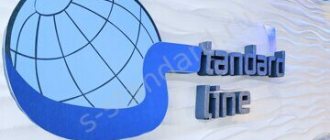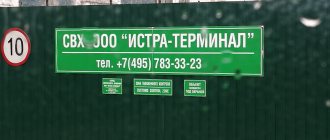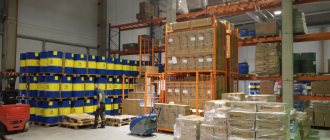HomeCustoms clearance Customs declarant
A customs declaration is an official government document that contains information about the goods being transported that allows them to legally cross the border. When exporting goods from Russia, an export declaration is drawn up, and when importing goods, an import declaration is drawn up.
A customs declarant is an individual or legal entity who has the right, granted by customs authorities, to export and import goods and property, interacting with points there. control when moving cargo across the border. His responsibilities include declaring goods and cargo of a company or individual. Submission of information to the customs authority is carried out by submitting information in electronic form, and for individuals - on paper. The concept of “Declarant” in customs law can include both an employee on the staff of a company participating in foreign trade activities and a declarant of a customs representative (customs broker employee).
At the same time, this position of a customs declarant allows one to significantly reduce the time and costs associated with the delay of goods during their “customs clearance” or “customs clearance” at customs, and therefore such a specialist is a valuable employee.
The customs declarant specialty began to gain popularity in the early 90s after the collapse of the USSR, when customs borders opened and the flow of goods increased significantly.
The profession of a customs declarant is in great demand for any companies engaged in foreign economic activity. If the company carries out: export and import of goods, temporary export, re-export, re-import, customs transit, processing in the customs territory, processing outside the customs territory, release for domestic consumption, processing for domestic consumption, temporary import, that is, movement of goods across the border, then she just needs a customs specialist who will deal with the declaration, “customs clearance” or “customs clearance” of goods (this can be either a declarant, a foreign trade manager or a logistician).
A customs declarant of goods is a person who declares goods when moving across the state border. All goods transported by participants in foreign trade activities (individuals and legal entities) are subject to written declaration to the customs authorities of the Russian Federation.
Services of a professional customs declarant for registration of your cargo or goods at any customs office in Russia!
Documents and information necessary for the customs declarant to clear goods at customs
- List of documents for registration of an individual at customs (View)
- List of documents for registration of a Legal entity at customs (View)
- List of documents for registration of an individual entrepreneur at customs (View)
- List of documents for customs clearance Import (View)
- List of documents for customs clearance Export (View)
Responsibilities of the customs declarant and rights
The rights and obligations of the customs declarant are prescribed in the Customs Code of the Eurasian Economic Union. When placing cargo under the customs regime and performing other procedures, the declarant has the right to be present during customs control, inspect, measure and take samples of products under control, as well as get acquainted with the results of studies of product samples and appeal the actions of customs if he disagrees with the results of decisions of customs officers.
The duties of the customs declarant are extensive and include:
- Knowledge of the legislation of the country of registration;
- Specialized education or a certificate of a customs clearance specialist;
- Full understanding of foreign trade documents for customs purposes;
- Assistance, verification and preparation of documents for customs;
- Checks the correctness, completeness and completeness of transportation and accompanying documents;
- Registration of cargo customs declarations of various types (DT or CCD, declarations for goods, passenger declarations) for international transportation of cargo;
- Performs calculations of due customs payments and fees, guided by regulations of the Government of the Russian Federation, the Customs Code (TC) and other regulatory documents of the customs authorities of the Russian Federation;
- Submission of a declaration by the declarant to customs;
- Enters information in the established volume into the automated control system or transfers it to the customs authority for subsequent release;
- If necessary, attends customs inspections or inspections;
- Provides customs authorities with all necessary permits and certificates;
- Issues issued documents to consignors and consignees after the goods are released at customs for further shipment to the consignee;
- Controls the correct write-off of funds by the customs authority;
- Transfers documents issued by customs to its customer;
- Submits reports on the work done.
Legal status of the declarant
Home — Articles
The declarant is “a key concept in customs law” (Explanatory Dictionary of Customs Law, edited by Prof. A.N. Kozyrin. M.). In accordance with paragraphs. 6 clause 1 art. 4 of the Customs Code of the EurAsEC, the declarant is the person who declares the goods or on whose behalf the goods are declared. The definition of a declarant in the EurAsEC Customs Code completely coincides with the definition in the International Convention on the Simplification and Harmonization of Customs Procedures.
The list of persons who may be declarants of goods transported across the customs border of the EurAsEC Customs Union is established by Art. 186 TC CU EurAsEC:
1) a person of a member state of the EurAsEC CU : who has concluded a foreign economic transaction or on whose behalf (on behalf of) this transaction was concluded; having the right to own, use and (or) dispose of goods - in the absence of a foreign economic transaction;
2) foreign persons : an individual moving goods for personal use; a person enjoying customs benefits in accordance with Chapter. 45 Labor Code of the Customs Union of the EurAsEC; an organization that has a representative office established on the territory of a member state of the EurAsEC CU in the prescribed manner - when declaring customs procedures for temporary import, re-export, as well as customs procedures for release for domestic consumption only in relation to goods imported for the own needs of such representative offices; a person who has the right to dispose of goods outside the framework of a transaction, one of the parties to which is a person from a member state of the EurAsEC CU.
In case of application for a customs transit procedure, declarants may also be:
1) carrier, including customs carrier;
2) a forwarder, if he is a person of a member state of the EurAsEC CU.
From the definition of the concept of “declarant” it follows that the main goal, which was solved by introducing this concept, is to identify the entity performing the key customs operation - customs declaration. Declaration, statement by the declarant to the customs authority of information about the goods, about the chosen customs procedure and (or) other information necessary for the release of goods (clause 27, clause 1, article 4 of the Customs Code of the EurAsEC) is one of the duties of the declarant established by art. 188 Labor Code of the Customs Union of the EurAsEC. In addition to declaring, the declarant bears the burden of paying customs duties, including customs duties, and (or) ensuring their payment in accordance with the Customs Code of the EurAsEC. In connection with the participation of the declarant in customs-tariff legal relations, the question arises of determining the moment from which the declarant, as a subject of law, can be considered a subject of customs-tariff legal relations. In accordance with the theory of law, the subjects of a legal relationship are the participants in the legal relationship who have mutual rights and obligations. Consequently, the subject of law becomes the subject of customs tariff legal relations when he acquires rights and obligations related to the imposition of import and export customs duties on goods moved across the customs border. One of the legal facts with which the EurAsEC CU Customs Code connects the emergence of the declarant’s obligation to pay customs duties is the registration of a customs declaration by the customs authority (for example, clause 1 of Article 211 of the EurAsEC CU Customs Code).
Both individuals and legal entities can declare goods. The legal status of individuals depends on a number of circumstances, which include, inter alia, age, citizenship, state of mental health, gender, etc. and determine “what qualities subjects of law must have in order to have rights and bear responsibilities in the relevant industry rights". Customs declaration of goods for personal use of an individual under sixteen years of age is carried out by the person accompanying him (one of the parents, adoptive parent, guardian or trustee of this person, another person accompanying him or a representative of the carrier in the absence of accompanying persons, and in case of organized departure (entry) ) a group of minors unaccompanied by parents, adoptive parents, guardians or trustees, other persons - by the group leader or a representative of the carrier) (clause 5 of Article 355 of the Labor Code of the Customs Union of the EurAsEC). Consequently, an individual who has not reached the age of sixteen cannot be a declarant and, as a consequence, a subject of customs tariff relations.
Features of the legal status of individuals as participants in customs and tariff legal relations moving goods for personal use across the customs border of the EurAsEC Customs Union are defined in the Agreement between the Government of the Russian Federation, the Government of the Republic of Belarus and the Government of the Republic of Kazakhstan dated June 18, 2010 “On the procedure for the movement of goods by individuals for personal use across the customs border of the Customs Union and performing customs operations related to their release" (hereinafter referred to as the Agreement dated June 18, 2010). In particular, cases of exemption from customs duties for certain categories of goods for personal use and the procedure for applying customs duties in relation to goods for personal use are determined (Clause 1, Article 1 of the Agreement dated 06/18/2010).
The obligation to pay customs duties when moving goods for personal use arises for individuals only when moving goods that are subject to customs declaration in writing (Clause 1, Article 13 of the Agreement dated June 18, 2010), which include: goods for personal use, transported in unaccompanied baggage or delivered by the carrier to an individual; goods for personal use, transported by any means, subject to prohibitions and restrictions, except for non-tariff and technical regulation measures, etc. (clause 2 of article 8 of the Agreement dated June 18, 2010). The obligation to pay customs duties arises from the declarant at the time of registration of the passenger customs declaration by the customs authority. Legal facts in connection with which the obligation to pay customs duties in respect of goods for personal use that are subject to customs declaration in writing are terminated include: refusal by the customs authority to release goods for personal use; payment or collection of customs duties in full; destruction or irretrievable loss of goods, etc. (Clause 2, Article 13 of the Agreement dated 06/18/2010).
In addition to the legal facts mentioned above, the obligation to pay customs duties in relation to vehicles registered in the territory of a foreign state and temporarily located on the territory of the EurAsEC Customs Union terminates from the moment of export of such a vehicle until the expiration of the temporary import period established by the customs authority, or from the date issuance by the customs authority of permission to transfer the vehicle by the declarant to another person for the purpose of exporting the vehicle (clause 1, clause 5, article 14 of the Agreement dated June 18, 2010).
The responsibility for calculating customs duties in relation to goods for personal use transported across the customs border lies with the official of the customs authority (clause 1 of Article 360 of the Labor Code of the Customs Union of the EurAsEC). A feature of customs tariff legal relations, where one of the subjects is an individual moving goods for personal use, is the payment of customs duties and taxes either at a single rate without division into component customs duties and taxes, or in the form of an aggregate customs payment (clause 2 of Art. 360 Labor Code of the Customs Union of the EurAsEC). The lists of goods exempt from customs duties, goods in respect of which it is necessary to pay customs duties at uniform rates of customs duties, and goods in respect of which customs duties are paid in the form of a cumulative customs payment are presented in the Agreement dated June 18, 2010.
The uniform rates of customs duties and taxes for goods for personal use transported across the customs border are given in Appendix 5 of the Agreement dated June 18, 2010.
The calculation of the total customs payment, equal to the amount of customs duties and taxes when importing goods into the customs territory of the EurAsEC CU, is made on the basis of the rates of customs duties established by the EurAsEC CU CCT, and taxes, the rates of which are established by the legislation of the member states of the EurAsEC CU (clause 2 of Art. 77 Labor Code of the Customs Union of the EurAsEC).
It should be noted that the possibility of an individual participating in customs and tariff legal relations may depend on the presence of a legal connection with a member state of the EurAsEC CU. For example, security for the payment of customs duties when importing vehicles registered on the territory of foreign states must be provided only to an individual of a member state of the EurAsEC CU (Clause 1, Article 16 of the Agreement dated June 18, 2010), and a foreign citizen is exempt from providing security for the payment of customs duties. payments.
The legal capacity and capacity of a legal entity arise simultaneously and in the Russian Federation coincide with the moment of its state registration (clause 3 of article 49 and clause 2 of article 51 of the Civil Code of the Russian Federation (part one) of November 30, 1994 N 51-FZ). The legal personality of a legal entity depends on the legislation of the state in accordance with which the legal entity was created. If a legal entity is created in accordance with the legislation of a member state of the EurAsEC CU, then it can be a declarant if it has entered into a foreign economic transaction, or such a transaction was concluded on its behalf, or has the right to own, use and (or) dispose of goods (clause 1 Article 186 of the Labor Code of the Customs Union of the EurAsEC). An organization created in accordance with the legislation of a foreign state may be a declarant in the cases listed in paragraphs. 2 tbsp. 186 Labor Code of the Customs Union of the EurAsEC.
The scope of the rights and obligations of the declarant is presented in Art. Art. 187 and 188 of the Labor Code of the Customs Union of the EurAsEC, respectively, and includes the obligation to pay customs duties and (or) ensuring their payment in accordance with the Labor Code of the Customs Union of the EurAsEC. The list of rights and obligations of the declarant is open, but other rights and obligations of the declarant can only be contained in the EurAsEC Customs Code (clause 8, article 187 of the EurAsEC Customs Code and clause 6, article 188 of the EurAsEC Customs Code).
In connection with the “border” nature of customs and tariff legal relations, the features of the payer of customs duties are highlighted, one of which is the possibility of “delegating one’s rights and obligations to pay customs taxes to another person who independently interacts on this issue with the customs authority.” In the EurAsEC CU, the declarant can delegate the right to carry out customs operations to a customs representative - a legal entity of a member state of the EurAsEC CU, performing customs operations on behalf and on behalf of the declarant or another interested party in accordance with the customs legislation of the EurAsEC CU (clause 34, clause 1, art. 4 TC CU EurAsEC). There is no prohibition on the payment of customs duties for the declarant by the customs representative of the Customs Union of the EurAsEC, and at the national level of the member states of the EurAsEC CU there are direct indications of the possibility of payment of customs duties by the customs representative for the declarant. For example, in the Russian Federation, a customs representative may pay customs duties if the content of the customs procedure determined for declaring goods provides for their payment and if the terms of the agreement concluded between the declarant and the customs representative provide for the payment of customs duties by the customs representative (Clause 5, Article 60 Federal Law of November 27, 2010 N 311-FZ “On customs regulation in the Russian Federation”). In the Republic of Kazakhstan, from July 1, 2011, the obligation of the customs representative to pay customs duties arises jointly with the payer of customs duties (clause 7, article 30 of the Code of the Republic of Kazakhstan dated June 30, 2010 N 296-IV “On customs affairs in the Republic of Kazakhstan”).
Consequently, the customs representative on the territory of the EurAsEC Customs Union can participate in customs and tariff legal relations and pay customs duties for the declarant. This distinguishes the obligation to pay customs duties, which can be transferred to another person, from the obligation to pay tax, which is inextricably linked with the personality of the taxpayer.
When placing goods under certain customs procedures, criteria may be established that narrow or expand the circle of persons who have the right to act as a declarant. For example, by expanding the circle of persons who have the right to act as a declarant and specified in paragraphs. 1 and paragraphs. 2 tbsp. 186 of the EurAsEC CU Customs Code is permission for a carrier (including a customs carrier) or a forwarder to act as a declarant if they are persons of a member state of the EurAsEC CU (clause 3, Article 186 of the EurAsEC CU TC).
The customs procedure for duty-free trade establishes additional criteria that narrow the circle of persons who have the right to act as a declarant. These criteria are:
— the declarant must be the owner of a duty-free store included in the register of owners of duty-free stores (clause 1, article 33 of the Labor Code of the Customs Union of the EurAsEC);
— the sale of declared goods must be carried out in a duty-free store, the owner of which is the declarant of these goods (clause 2, article 303 of the Labor Code of the Customs Union of the EurAsEC).
Another case where there are restrictions on the circle of persons who have the right to act as a declarant is the customs procedure of a free warehouse, the declarant of which can be the owner of a free warehouse or another person determined by the legislation of the member states of the EurAsEC CU. The legal status of the owner of a free warehouse is determined by the Agreement between the Government of the Russian Federation, the Government of the Republic of Belarus, the Government of the Republic of Kazakhstan dated June 18, 2010 “On free warehouses and the customs procedure of a free warehouse” (hereinafter referred to as the Agreement dated June 18, 2010 “On free warehouses”). The owner of a free warehouse can be a legal entity of a member state of the EurAsEC CU, which is included in the register of owners of free warehouses (Clause 1, Article 3 of the Agreement dated June 18, 2010 “On Free Warehouses”). The obligation to pay import customs duties arises with the owner of a free warehouse from the moment the customs authority registers the customs declaration submitted to place goods under the customs procedure of a free warehouse. Termination of the obligation to pay customs duties occurs upon completion of the customs procedure for a free warehouse or on the grounds established by clause 2 of Art. 80 TC CU EurAsEC.
The conditions defined in the Customs Code of the EurAsEC CU, which narrow the circle of persons who have the right to act as a declarant, do not contradict, as it might seem at first glance, clause 3.7 of the International Convention on the Simplification and Harmonization of Customs Procedures, according to which any person who has the right to dispose of goods, has the right to act as a declarant. For example, the owner of a duty-free store has the authority to determine the further legal fate of the goods (alienation under a sales contract, destruction, placement under the customs procedure of re-export, etc.).
As a general rule, the obligation to pay customs duties arises for the declarant from the moment the customs declaration is registered by the customs authority. However, the obligation to pay customs duties may also arise in the event of other legal facts, the list of which depends, among other things, on the status of the person participating in customs legal relations. For example, when a subject of customs law receives the status of an authorized economic operator, along with other special simplifications, the subject receives the opportunity to release goods before submitting a customs declaration (clause 2, clause 1, article 41 of the EurAsEC Customs Code), if the amount of import customs duties and taxes payable is not exceeds the amount of security for the payment of customs duties provided upon inclusion in the register of authorized economic operators (clause 4 of article 197 of the Labor Code of the Customs Union of the EurAsEC). In the case of the release of goods before filing a customs declaration, the obligation to pay customs duties arises at the time of release of goods (clause 1, clause 2, article 197 of the TSEurAsEC Labor Code), and is terminated on the general grounds listed in art. 80 TC CU EurAsEC.
The legal status of the declarant may be influenced by the category of goods transported across the customs border. The declarant may have the right to release goods before submitting a customs declaration, subject to a number of conditions. For example, declaration of certain categories of goods (clause 1 of Article 197 of the Labor Code of the Customs Union of the EurAsEC), which include: goods necessary to eliminate the consequences of natural disasters, natural and man-made emergencies; military products necessary to carry out peacekeeping activities or conduct exercises; goods subject to rapid deterioration; live animals, etc. (Article 178 of the Labor Code of the Customs Union of the EurAsEC).
At the supranational level, an open list of grounds has been established on which the termination of the obligation to pay customs duties is associated (clause 2 of Article 80 of the Labor Code of the Customs Union of the EurAsEC). In particular, termination of the obligation to pay customs duties occurs when they are paid, goods are placed under the customs procedure for domestic consumption, goods are placed under the customs procedure of refusal in favor of the state, and other circumstances arise with which the EurAsEC Customs Code connects the termination of the obligation to pay customs duties.
Legal entities acting as declarants in customs tariff relations calculate customs duties independently (clause 1, article 76 of the Labor Code of the Customs Union of the EurAsEC), with the exception of cases of collection of customs duties. When collecting customs duties, the calculation of the amounts of customs duties payable is carried out by the customs authority of the member state of the EurAsEC CU in which customs duties are payable (clause 2 of Article 76 of the Customs Code of the EurAsEC CU).
Thus, the legal status of the declarant in customs tariff relations depends on:
— legal connection with the member state of the EurAsEC CU;
— status of a person (individual or legal entity);
— categories of goods being moved.
An individual can be a participant in customs tariff relations only upon reaching 16 years of age. One of the features of the participation of individuals in customs tariff legal relations is that the payment of customs duties can occur both at uniform rates of customs duties and taxes, and in the form of an aggregate customs payment.
The legal capacity and capacity of legal entities arise simultaneously and in the Russian Federation coincide with the moment of its state registration (clause 3 of article 49 and clause 2 of article 51 of the Civil Code of the Russian Federation).
The peculiarity of the obligation to pay customs duties is that, unlike the obligation to pay tax, it is not an obligation inextricably linked with the personality of the taxpayer, and can be transferred to another person - the customs representative.
March 2013
Customs declaration of goods, Declarant
On the declaration of goods sold in duty-free stores (Duty Free)
Customs declaration of goods in the Customs Union
Full or temporary customs declaration
Information customs technologies: electronic declaration, remote release, preliminary information, customs payment card, electronic freight
Declaration of goods during customs operations
Responsibility of the customs declarant
The joint liability of the declarant and the customs representative is established by the norms of the legislation of the Russian Federation. The declarant and the customs representative acting on behalf of the declarant are held liable in the following cases:
- For providing false information about goods, if the transportation of such goods violates the laws of the Russian Federation or other countries;
- For incorrect classification of goods for the purpose of underpayment or tax evasion;
- For providing false or invalid documents for goods.
The declaration process is strictly formalized; its implementation requires a whole range of software and hardware, therefore the services of a customs declarant with extensive experience, relevant knowledge and understanding of the entire process are a guarantee of passing customs control quickly, without errors and bureaucratic red tape. And to avoid all these problems and difficulties, cargo delays at the border, entrust customs clearance of goods to professionals.
Our company provides all types of customs services, including customs clearance of goods and cargo, filling out and submitting cargo customs declarations. We are an experienced customs declarant and can represent your interests at any customs office of the Russian Federation, we will fill out and formalize all customs documents, we work with legal entities and individuals, individual entrepreneurs and large companies.
Experienced declarants will take over the functions of your customs representative, we will ensure that all necessary documentation is collected and we will fill out customs declarations in strict accordance with established requirements.
Customs declarant services
For many years, our company has gathered only the best specialists in this field of activity, and is ready to easily complete all your tasks of customs clearance of any cargo and goods.
We work with any participants in foreign economic activity (FEA):
- Individuals
- Legal entities
- Individual entrepreneurs
We are ready to assume all obligations of the customs declarant for declaring any goods at any customs clearance points in the Russian Federation (with the exception of goods prohibited for movement across the State Border). This service takes on average from several hours to 1 day. We provide declarant services necessary for you and your company: online declarant, remote declarant, conducting declarant, stuffing and releasing declarant for prompt clearance and release of goods at customs moved by any modes of transport: road, air, sea, rail and multimodal (combined)! It is very important for us to provide assistance in a short time and under the most convenient conditions for our partners!
Do you need a declarant? We will be happy to help you!
Who is a customs declarant?
A declarant is a specialist in customs clearance; according to customs law, this concept can include both an employee of an enterprise conducting international trade in foreign economic activity and a specialist from a company that provides customs representative services. A customs declarant under the EAEU Customs Code can be either an individual or a legal entity that has the right to export or import goods through customs checkpoints across the state border.
The customs declarant has the right to export or import goods through customs checkpoints
The customs declarant is engaged in the preparation, completion and submission of cargo customs declarations and declarations of customs value. The responsibilities of the declarant for customs clearance also include submitting all required documentation, calculating and adjusting the customs value, paying customs duties, making any corrections if required by customs, adjustments, and providing additional information.
The declarant draws up a TD for goods and other accompanying documentation, certifies them with his electronic digital signature (EDS), and then sends them to the information operator. The response or other messages from the customs inspector travel back to the declarant.
The following may act as a customs declarant:
- individuals to declare products transported for personal use;
- foreign companies that have registered representative offices;
- foreign persons who are entitled to customs preferences;
- carriers representing different countries of the world, if transit is used as the declared customs procedure.
That is, to summarize, a customs declarant is a specialist who is responsible for carrying out all interactions with customs authorities when importing or exporting goods across the state border and registering them at customs checkpoints. Having such a specialist on staff or hiring a declarant in companies that deal with customs representation significantly reduces the costs of customs clearance and clearance of goods, which means it saves time, money, promotes stable business activities and compliance with the terms of the supply contract.
But keeping your own declarant on staff as a permanent employee, especially if foreign economic activity is accompanied by regular transportation, is quite expensive. Therefore, in this case, they often use the services of a customs representative, who plays the role of an intermediary between the owner of the cargo and customs, but performs all the functions of the declarant.
Independent preparation of customs declarations takes time and requires financial investments in the preparation of documents
In addition, he will entrust the implementation of all actions and procedures at customs to a professional declarant of a customs representative - this is a guarantee that customs control will be completed quickly and without problems, and all goods will be correctly declared in compliance with all legal requirements. The responsibility of the customs broker is insured, and he is included in the register of customs representatives and has the appropriate certificate.
Obligations of the customs representative
The customs representative is obliged to perform the following types of actions:
- Declares transported goods;
- Places goods under the selected customs procedure;
- Provides customs authorities with all necessary information about transported products;
- Provides reports to the relevant authorities;
- If necessary, pays customs duties.
In the concluded agreement between the customer and the broker, the obligations of the latter cannot be limited.









